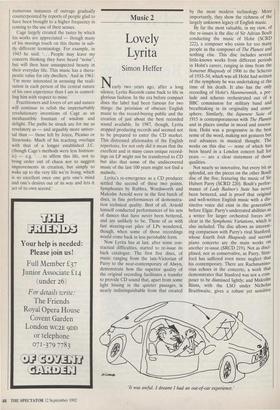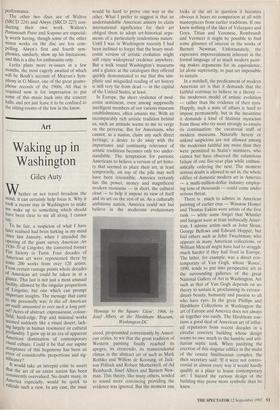Music 2
Lovely Lyrita
Simon Heffer
Nearly two years ago, after a long silence, Lyrita Records came back to life in glorious fashion. In the era before compact discs the label had been famous for two things: the provision of obscure English music to the record-buying public and the creation of just about the best recorded sound available. In 1987, though, Lyrita stopped producing records and seemed not to be prepared to enter the CD market. This distressed aficionados of the English repertoire, for not only did it mean that the excellent and in many cases unique record- ings on LP might not be transferred to CD but also that some of the undiscovered music of the last 100 years might not find a midwife.
Lyrita's re-emergence as a CD producer settled the second of these two points. Symphonies by Rubbra, Wordsworth and Malcolm Arnold were in the first batch of discs, in fine performances of demonstra- tion technical quality. Best of all, Arnold himself conducted performances of his sets of dances that have never been bettered, and are unlikely to be. Those of us with fast wearing-out piles of LPs wondered, though, when some of those recordings would come back in less perishable form.
Now Lyrita has at last, after some con- tractual difficulties, started to re-issue its back catalogue. The first five discs, of music ranging from the late-Victorian of Parry to the near-contemporary of Alwyn, demonstrate how the superior quality of the original recording facilitates a transfer to provide CD sound that, apart from some light hissing in the quieter passages, is nearly indistinguishable from that created
by the most modern- technology. More importantly, they show the richness of the largely unknown legacy of English music. By far the most valuable, in my view, of the re-issues is the disc of Sir Adrian Boult conducting the music of Hoist (SCRD 222), a composer who exists for too many people as the composer. of The Planets and nothing else. This disc includes several little-known works from different periods in Hoist's career, ranging in time from the Somerset Rhapsody of 1906 to the Scherzo of 1933-34, which was all Hoist had written of the symphony he was undertaking at the time of his death. It also has the only recording of Hoist's Hammersmith, a pre- lude and scherzo orchestrated out of a BBC commission for military band and breathtaking in its originality and atmo- sphere. Similarly, the Japanese Suite of 1915 is contemporaneous with The Planets and in places similar in mood and innova- tion. Hoist was a progressive in the best sense of the word, making not gestures but real advances in musical thought. The works on this disc — none of which has been heard in a London concert hall for years — are a clear statement of those qualities.
Not nearly so innovative, but every bit as splendid, are the pieces on the other Boult disc of the five, featuring the music of Sir Hubert Parry (SCRD 220). Boult's perfor- mance of Lady Radnor's Suite has never been bettered, and is proof that original and well-written English music with a dis- tinctive voice did exist in the generation before Elgar. Parry's underrated abilities as a writer for larger orchestral forces are clear in the Symphonic Variations, which is also included. The disc allows an interest- ing comparison with Parry's rival Stanford, whose fourth Irish Rhapsody and second piano concerto are the main works on another re-issue (SRCD 219). Not as disci- plined, nor as conservative, as Parry, Stan- ford has suffered even more neglect that his contemporary. There are Rachmanino- vian echoes in the concerto, a work that demonstrates that Stanford was not a com- poser to be dismissed lightly; and Malcolm Binns, with the LSO under Nicholas Braithwaite, gives a robust yet sensitive 'It was awful. I dreamt I had an out-of-car experience.' performance.
The other two discs are of Walton (SRCD 224) and Alwyn (SRCD 227) con- ducting their own work. Walton's Portsmouth Point and Scapino are especial- ly worth having, though some of the other minor works on the disc are less com- pelling. Alwyn's first and fourth sym- phonies, similarly, show up his limitations, and this is a disc for enthusaists only.
Lyrita plans more re-issues in a few months, the most eagerly awaited of which will be Boult's account of Moeran's Sym- phony in G Minor, one of the great gramo- phone records of the 1960s. All that is required now is for impresarios to put some of this music back into the concert halls, and not just leave it to be confined to the sitting-rooms of the few in the know.



































































 Previous page
Previous page